What About
Gut Health?
Eating whole grains, like wheat, can positively impact gut health by helping achieve a balanced microbiome.

Eating whole grains, like wheat, can positively impact gut health by helping achieve a balanced microbiome.

When we eat certain types of dietary fibre, they are fermented by microbes in our gut which produce short chain fatty acids (SCFAs). SCFAs do a lot for our gut health including:
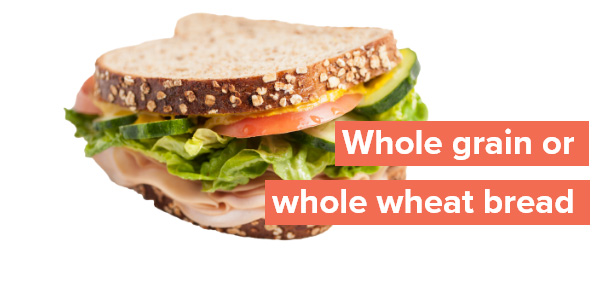
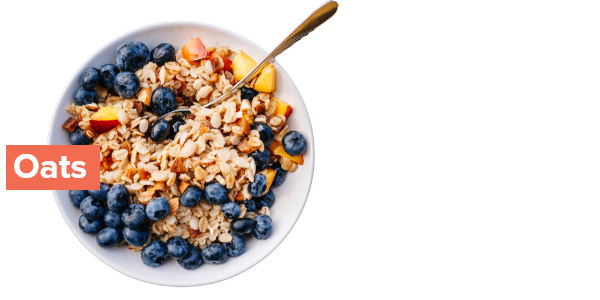
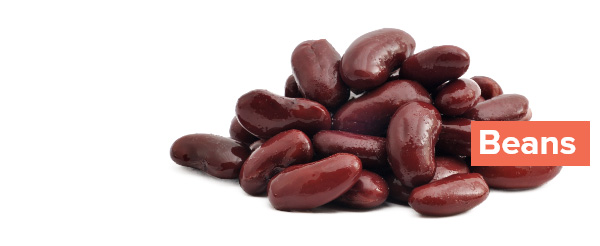
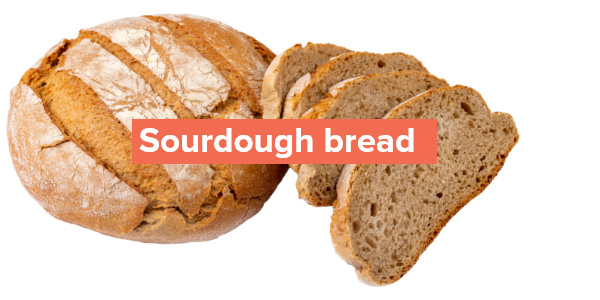
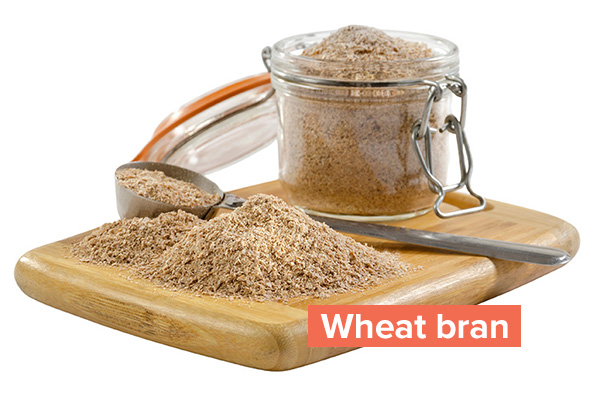

Prebiotics are a type of fibre that feed the good bacteria in your gut. Whole grains, whole wheat and beans are great sources of prebiotics.
Probiotics are live microorganisms that, when administered in adequate amounts, confer a health benefit on the host.1 You can find probiotics in some yogurts or kefir, as well as in supplements.
Postbiotics are inactivated microbes or parts of microbes. Postbiotics are being explored for their health benefits.
Add more beneficial bacteria to your diet. Probiotics can be found in some yogurts, kefir or as a supplement.
Provide energy for you and your gut bacteria by adding prebiotic high fibre foods like whole grains, whole wheat, or beans.
Add some prebiotic wheat bran to your favourite recipes or sprinkle on yogurt or cereal. A recent research review showed that as little as 6 g (or 2 Tbsp) of wheat bran per day promoted gut microbiota diversity.2
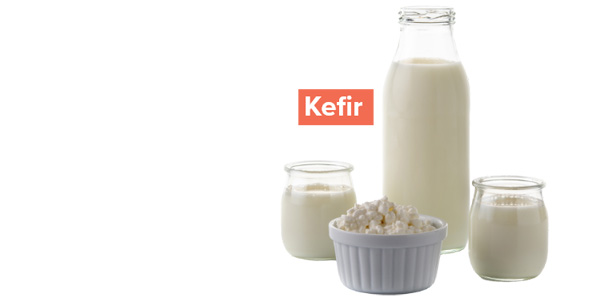


Gut health is important, and goes beyond good digestion. Gut health impacts overall health.
Eating whole grains, like wheat, can positively impact gut health by helping achieve a balanced microbiome.
Good gut health can have positive long-term health implications, such as reduced disease risk, improved brain health, and a well supported immune system.
“The gut” is your digestive tract, also known as the alimentary canal. It is a long tube of connected organs starting at your mouth and moving through the esophagus, stomach, small intestine, large intestine, colon and anus.
Gut health is traditionally measured by motility (transit time, stool frequency, stool consistency), histology (structure of cells), permeability of the gut, and other measures of compounds in the stool or tissues.
Researchers are beginning to measure gut health based on the composition and diversity of gut bacteria. Bacteria in the digestive system are important for the digestion and absorption of food and its nutrients, but they also play a key role in modulating disease.
A proper balance of bacteria – more beneficial bacteria and fewer opportunistic bacteria – is important for good gut health, and is increasingly being recognized as influencing overall health.
All of the microorganisms in the human gut, including bacteria, are known as the human gut microbiota. The understanding of the human gut microbiota’s role in health and disease is evolving as more research is being done.

Microorganisms are found throughout the gut, and their concentration increases along the gastrointestinal tract, with smaller numbers in the stomach, and very high concentrations in the colon.
Each person’s microbiome is unique to them, and there are many factors at play in shaping the composition of intestinal microbial communities. These include colonization history (how gut microbes become established from infancy onward), exposure to microbes from animals, dietary intake, and the environment. Humans are essentially sterile before they are born. The transfer of microbes during birth and in the first years of life have a lasting impact on the composition of intestinal microbial communities. Simply put, the first microbe that can occupy a specific niche is usually able to defend its niche against other microbes that arrive later.
After colonization history, diet is the second most important determinant of intestinal microbiota. A diverse diet that is rich in plant-based, minimally processed food provides fibre and plant phytochemicals to support a diverse microbial community. Intestinal microbiota respond very rapidly – within days – to changes in dietary intake.
Dietary intake can affect gut microbiota by changing:
By eating foods that contain whole grains and certain other foods high in dietary fibre, you can positively impact your gut microbiota.
Probiotics vs Prebiotics vs Postbiotics
Probiotics are defined by the World Health Organization as “live microorganisms which when administered in adequate amounts confer a health benefit on the host.” In other words, they are good microbes. Although often thought to include fermented foods like kombucha or kimchi, very few fermented foods meet the definition of a probiotic. That’s because probiotic activity is strain specific. Fermented foods with live active cultures are only considered probiotic if the food contains at least one strain that meets the criteria as being probiotic and has a well-studied species known to provide probiotic health benefits. Unfortunately, many fermented foods labeled as probiotic have undefined strains, at variable levels, that have health benefits have not been documented. Food sources of probiotics include some yogurts and kefir with specific strains of microbes.
Prebiotics are undigestible fibres that stimulate the growth or activity of certain good bacteria in the large intestine. In other words, they are fuel for our gut microbiota. Whole grain foods and certain other foods high in dietary fibre, like wheat, are a source of prebiotics.
Prebiotic fibre is metabolised by gut bacteria in a process called fermentation, producing short-chain fatty acids (SCFA), which can:
Postbiotics are an emerging concept defined as a preparation of non-living microorganisms and/or their components that confers a health benefit on the host. They are being explored as a means of reducing the risk of disease and improving health. While research supporting the use of postbiotics is promising, more evidence is needed to understand and support their role in human health.

Consuming grains, and wheat in particular, has been shown to have a positive effect on gut health.
A recent systematic review showed that as little as 6 g, (about 2 Tbsp) of wheat bran per day promoted gut microbiota diversity.
In another systematic review of human studies over 20 years, consuming as little as 8 g of wheat bran per day showed favourable changes, including increased gut microbiota abundance, diversity and metabolites.
Foods high in FODMAPs, which includes wheat, can exacerbate symptoms of Irritable Bowel Syndrome (IBS), resulting in some patients limiting intake of these foods. An unintended consequence is a low-fibre diet, which can negatively impact gut bacteria. Wheat-containing foods that are processed or fermented to reduce their FODMAP levels, such as sourdough fermented bread, may be better tolerated by people with IBS, allowing them to enjoy those foods and benefit from the fibre in wheat.
To learn more about FODMAPS, visit the Canadian Digestive Health Foundation.
Colorectal (bowel) cancer is the second-leading cause of death from cancer in men and the third-leading cause in women in Canada. It is estimated that almost half of the cases of colorectal cancer could be prevented through healthy lifestyle changes.
Studies show that consuming whole grains can decrease the risk of colorectal cancer, and this link is stronger in people without a history of colon cancer or polyps. A recent review of 99 studies, including data on 29 million people, of whom over 250,000 were diagnosed with colorectal cancer, found that whole grains independently lower cancer risk. Specifically, consuming approximately 90 g of whole grains per day (about 3 servings) reduces cancer risk by 17%.
Another review study found that the consumption of 10 g of cereal fibre per day was associated with a 9% decrease in colorectal cancer risk.

A recent study looked more closely at how dietary fibre and phytochemical components of wheat bran work to combat colon cancer. The results showed that the dietary fibre and phytochemical components of wheat bran work in a synergistic manner to combat colon cancer, at levels that we can achieve in our daily diet. This means consuming wheat-based foods will not only provide nutrients, but also fibre and phytochemicals that may contribute toward reducing colon cancer risk.
Researchers are studying the potential effect of eating whole grains, including whole wheat, on the brain and mental health.
Emerging research is looking at how microbes in the gut are connected and impact the brain. This connection is often referred to as the gut-brain axis. The gut-brain axis is a two-way communication network between the enteric (gut) and central nervous systems.
The network is made up of both physical (nerves) and chemical (neurotransmitters) connections between the brain and the gut. The network communication allows the brain to influence gastrointestinal activity and also allows the gut to influence brain activity (such as mood, cognition, and mental health).
A recent review study summarized the evidence from human studies that examined the association between dietary fibre intake and brain health. It concluded that diet quality, including adequate intake of dietary fibre, can influence cognitive performance, mental health, and brain function.
SCFAs, products of fibre fermentation, appear to be a key route of communication between the gut microbiota and the brain, as they support intestinal barrier integrity and regulate gastrointestinal immune cells.
While more high-quality human studies are needed to fully understand the connection between fibre from wheat-based foods and the gut-brain axis, emerging research shows promising results.
Eating whole wheat can play a key role in immune health by providing a rich source of dietary fibre and beneficial phytochemicals.
Wheat bran, the outer layer of the whole wheat kernel, is a source of antioxidants and dietary fibre, known to enrich and diversify intestinal microbial communities.
A rich and diverse gut microbiome can impact immune health in a variety of ways:
No matter where you live, the digestibility of food is determined by many factors.
Some people feel that they find it easier to digest wheat products, like breads and pastries, while vacationing in countries outside of Canada when compared to eating the same foods at home. But is this really true?
There are many factors that can affect a person’s ability to digest wheat products, including the protein composition of the wheat, how the flour is processed into the final product, and even a person’s individual stress level, state of mind and amount of physical activity.
Wheat is one of the most commonly grown and consumed crops around the world. Wheat can grow in all types of climates and each region grows wheat varieties that suit their environment. But not all wheat is equal. Some wheats have low protein, some have high protein and all of this impacts the types of flour that are milled.
A miller will blend wheat varieties to ensure the flour meets the requirements of the bakers, pasta makers and food companies. This may occur through blending of imported and domestically grown wheat.
Canada is known worldwide for its high-quality wheat that is exported to over 80 countries.
It is quite possible that a person could be consuming Canadian wheat while travelling abroad.
Enjoying wheat products in other countries can be part of a cultural experience. The digestibility of these foods, like bread for instance, can be affected by differences in how the dough is processed and the type of flour used.
For example, the slower fermentation process used in traditional sourdough bread making, breaks down the protein and lowers FODMAPS, which for some, makes the bread easier to digest. Whole grain flour used in some traditional recipes also provides fibre, which contributes to good digestion. These types of slow fermented or whole grain breads can often be found in artisanal style bakeries when travelling abroad.
Vacations can also have many positive effects on minds and bodies, as well as digestion. It’s a time to relax, enjoy new experiences and sample different foods with the company of friends and family. For some on vacation, the simple act of increased physical activity, like walking, can improve digestion, making it appear easier to digest wheat products when compared to their experiences at home. Lower stress levels, or the simple ‘vacation effect’ can also impact the ability to digest foods differently.